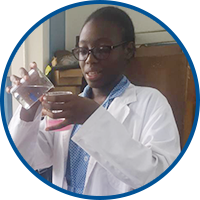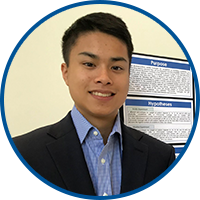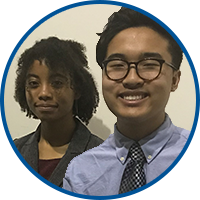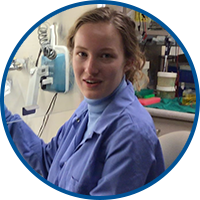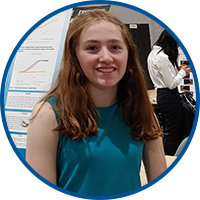DCAT Awards Scholarships at Virtual Regeneron ISEF 2020
Recognizing STEM excellence during the pandemic
Robbinsville, New Jersey June 22, 2020 — The Drug, Chemical & Associated Technologies Association (DCAT) awarded five scholarships to student finalists who participated in the Virtual Regeneron International Science & Engineering Fair (ISEF) held online May 18-22, 2020.
Regeneron ISEF is the world’s largest international pre-college science competition. Each year, the competition brings together approximately 1,800 high school students from more than 75 countries, regions and territories to showcase their independent research and compete for an average of $5 million in total prizes. DCAT participates as one of 50 Special Award Organizations representing government, industry and education across a wide variety of scientific disciplines that provide awards from their organizations.
When Regeneron ISEF 2020 was reimagined as a virtual event due to COVID-19, DCAT’s Science & Scholarship Committee jumped at the opportunity to continue its participation. “When they pivoted, we responded,” said Scott Price, DCAT’s Science & Scholarship Committee chairperson and Vice President of Sales at Ren-Pharm International, Ltd. “The students are just so passionate about this event we could not let their efforts go unrewarded. These projects are for most students the foundation for a STEM-based education and future career, so despite this unfortunate global crisis that has impacted us all, we felt that these deserving students needed to be recognized”.
The scholarship winners were picked after careful review of the students’ online abstracts and video presentations. The committee observed that the pool of eligible projects seemed less globally representative this year, possibly because of the cancellation of many science fairs due to the coronavirus and because some students did not create a video presentation for the virtual event.
“The ISEF students are all incredibly talented young scientists and are researching important topics and questions relevant to today’s scientific challenges,” said CaSondra Maass, committee volunteer and Project Manager at XGen Pharmaceuticals DJB. “They are applying many different creative approaches to help tackle issues like alternative energy, improving drug formulations, and exploring potential cures for debilitating diseases worldwide. It was very rewarding to feel like we can make a difference to them while they work to improve our world.”
Winning Projects
The five projects chosen by the committee ranged from conversion of biomass carbohydrates into an alternative energy source to drug formulation and delivery experiments to potential cures for cancer and amyotrophic lateral sclerosis (ALS).
Nyaradzo Nicole Mutiti, a sophomore at Queen Elizabeth Girls’ High School in Harare, Zimbabwe, won for her project, Direct Conversion of Biomass Carbohydrates to Platform Molecules. She used corn cobs, acetone, water, the sun, and widely available catalysts to create dimethylfuran, which can be converted into fuel. This would aid in resolving Zimbabwe’s recent fuel crisis, as well as replace fossil fuels.
Parker Hoang, a sophomore at Langley High School in Reston, Virginia, won for his project, Designing a Smarter Smart Hydrogel: Optimization of Poly(vinyl alcohol)-Sodium Borate Hydrogels by Physical Crosslinking with Sodium Alginate for pH-Responsive Controlled Drug Delivery, in which he used varying concentrations of sodium alginate to release lower levels of dye over greater amounts of time, in both acidic and basic conditions. Concentrations of 20-25% sodium alginate released drugs more slowly and over more time than typical Poly(vinyl alcohol)-sodium borate hydrogels used in the drug industry.
Tommy Huy Nguyen and Ashanah Sarai Gayden, both seniors at Rockdale Magnet School for Science and Technology in Conyers, Georgia, won for their project, Application of pH Responsive Nanogels for Targeted Drug Delivery. They successfully optimized nanogel drug delivery using a surfactant to crosslink the gel. They loaded the nanogel with cyclophosphamide and ensured the gel would hold the drug. The over-reaching goal was to deliver the drug safely to the target area without causing organ damage, a common area of concern for chemotherapy.
Grace Littler, a senior at Ponte Vedra High School in Ponte Vedra, Florida, won for her project, Analyzing the Effects of Hyaluronic Acid through Enzymatic Digestion in Cancer Cell-Derived Extracellular Vesicles. She investigated the metastasis of breast cancer to the brain via vesicles sent out by cancer cells. She stripped the main carbohydrate (hyaluronic acid) from the vesicles and treated human brain cells with them. Due to an assay issue, the results were inconclusive, however she plans to resolve this issue and investigate using healthy patient plasma.
Karah Mayer, a sophomore at Tanque Verde High School in Tucson, Arizona, won for her project, UG-Rich RNA is Key to Alleviating Neurodegeneration in a Drosophila Model of Amyotrophic Lateral Sclerosis (ALS). Using a fruit fly model, she investigated a protein that counteracts the formation of aggregates associated with ALS. It is thought that these aggregates lead to locomotor movement disfunction, and in the experiment fruit fly young were able to regain some of that movement using the investigated protein.
About DCAT
The Drug, Chemical & Associated Technologies Association (DCAT) is a not-for-profit, global business development association whose unique membership model integrates both innovator and generic drug manufacturers and suppliers of ingredients, development and manufacturing services, and related technologies. We are committed to provide programs, events and services that help our members meet their business objectives, expand their network of customers and suppliers, and gain insight into industry trends, markets, and those issues impacting pharmaceutical development and manufacturing. With over 400 corporate members, DCAT is headquartered in Robbinsville, New Jersey.

